
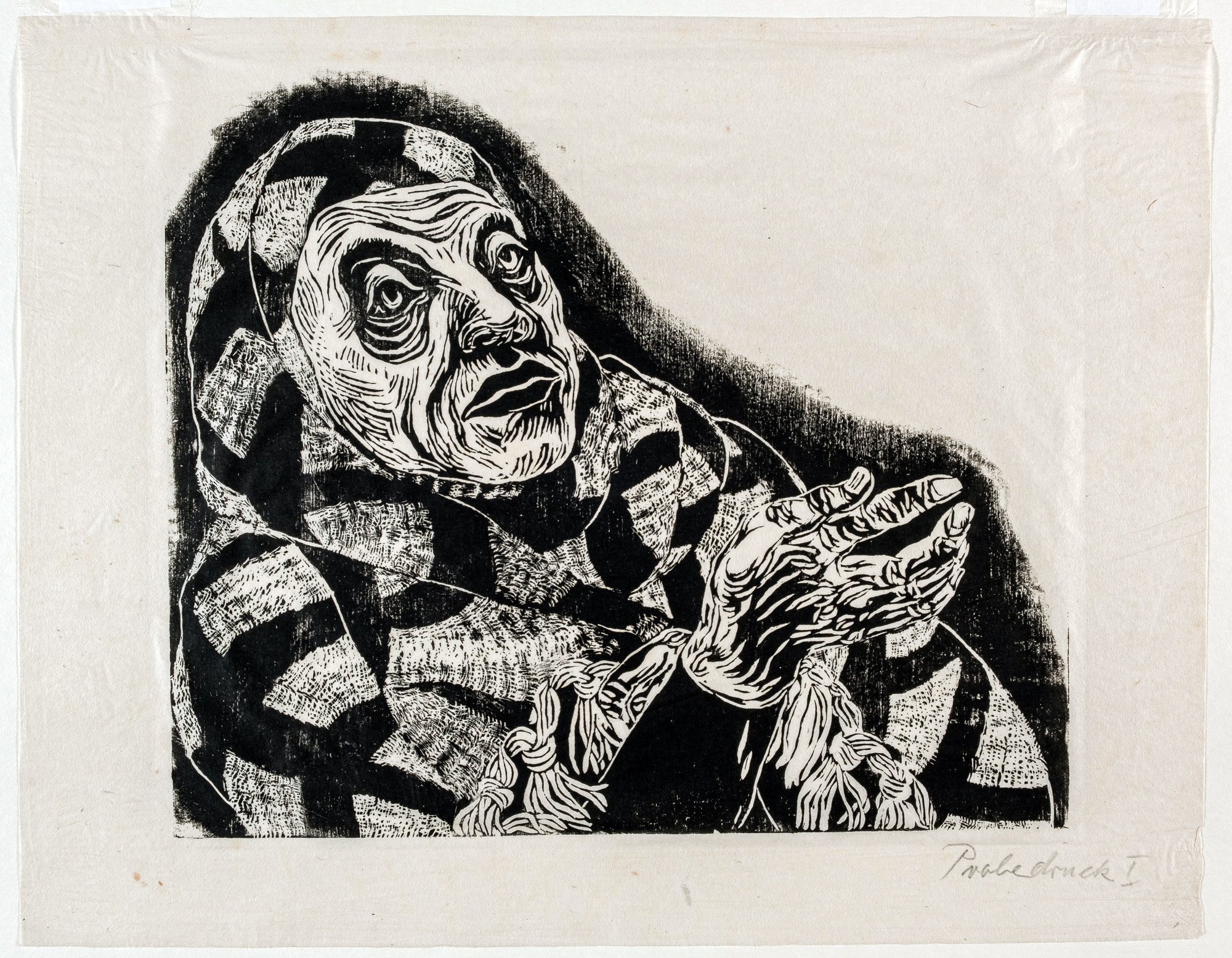
“Sweet Kitsch, I can’t do that.”
Maria Luiko (1904-1941)
With Wolfram P. Kastner and Mascha Erbelding, both Munich (Germany)
March 29, 2023 @ 12:00 pm - 1:00 pm
| FreeThe artistic work of Maria Luiko (1904-1941), born Marie Luise Kohn in Munich, is characterized by an impressive diversity. In addition to drawings, watercolors and oil paintings, she created prints using various printing processes and paper cuts, and designed book illustrations, stage sets and marionettes. Already during her studies at the local Academy of Fine Arts and her training at the School of Applied Arts she was included in exhibitions in the Munich Glass Palace (Münchner Glaspalast).
Her career was brutally cut short by the Nazi regime. As a Jew, Luiko was not able to join the Reich Chamber of Fine Arts (Reichskammer der bildenden Künste), a Nazi organization founded in 1933. Without membership, she could not obtain work materials, exhibit or sell her artwork. The Cultural Association of German Jews (Kulturbund Deutscher Juden) was founded to give Jews access to cultural life and to provide Jewish artists who had become unemployed with a livelihood. Until 1939 Luiko contributed to them and to the Marionette Theater of Munich Jewish Artists. A large part of her graphic work, in which she critically deals with the current living conditions and everyday situations, were created during this time. On November 20, 1941 Maria Luiko was deported to Kaunas in Lithuania together with her sister Dr. Elisabeth Kohn, her mother Olga Kohn (nee Schulhöfer) and 996 other Jews and murdered there.
Presentations by Wolfram P. Kastner, curator and artist, and Mascha Erbelding, director of the Puppet Theatre / Fairground Attractions Collection at Münchner Stadtmuseum (Munich City Museum), will be followed by Q&A. Moderated by Rachel Stern, director and CEO of the Fritz Ascher Society.
Image above: Maria Luiko, Beggar (Bettlerin), ca. 1935. Paper; Woodcut, 30 cm x 38,5 cm. Jewish Museum Munich (Jüdisches Museum München), Collection Maria Luiko
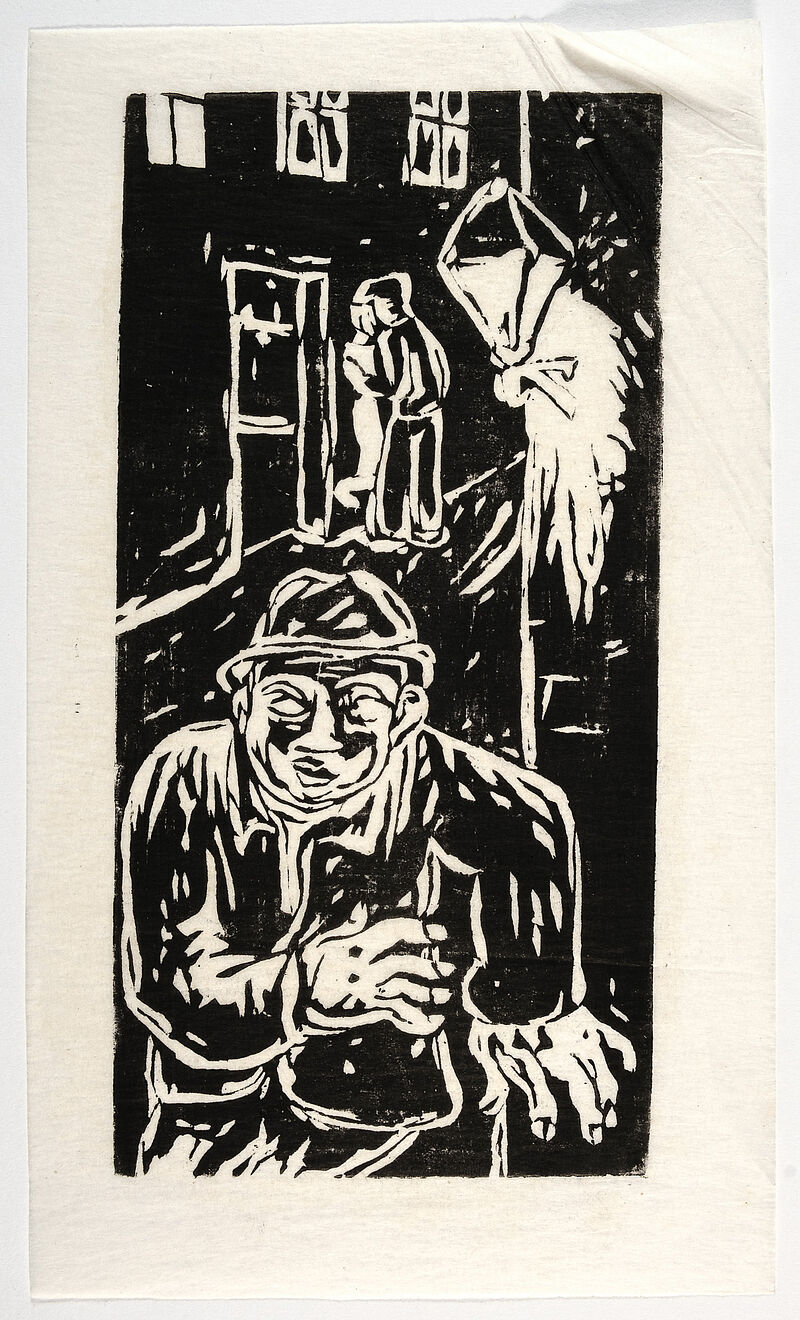
Maria Luiko, Man in Alley (Mann in Gasse I), ca. 1935. Linocut on Paper, 18,7 cm x 11 cm. Jewish Museum Munich (Jüdisches Museum München), Collection Maria Luiko
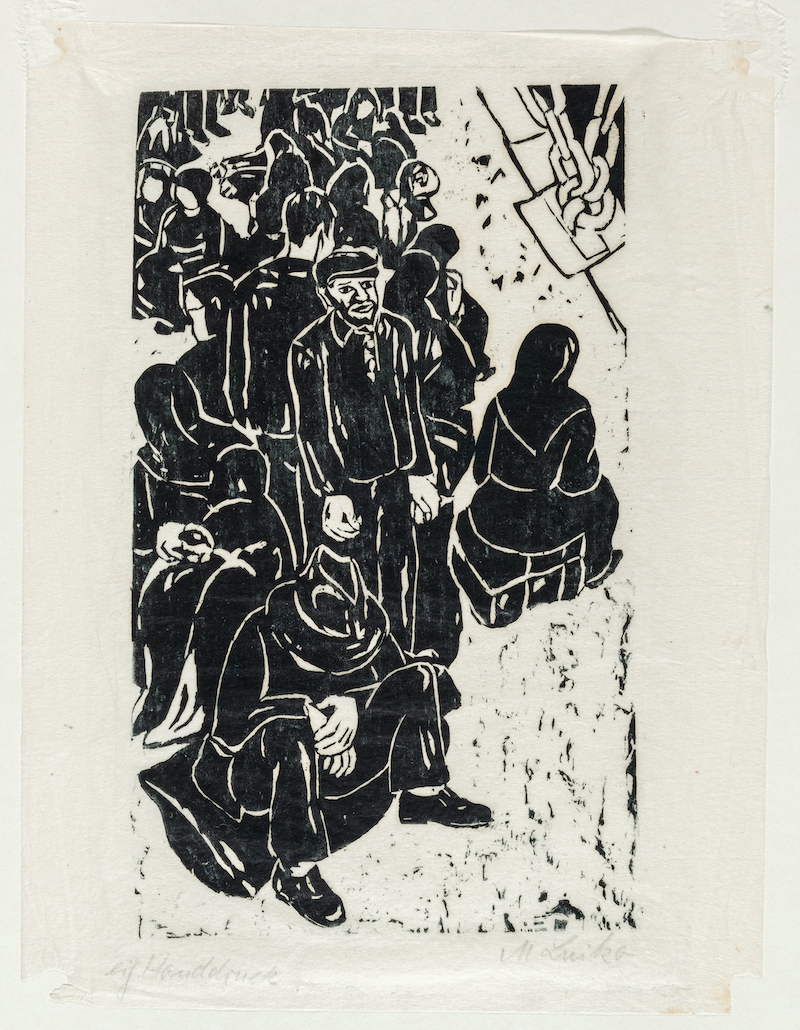
Maria Luiko, Group of People Before Deportation (Menschengruppe vor der Deportation), ca. 1938. Woodcut. Jewish Museum Munich (Jüdisches Museum München), Collection Maria Luiko
Maria Luiko (1904-1941) was a daughter of the grain wholesaler Heinrich Kohn and Olga Schulhöfer, her slightly older sister was the lawyer Elisabeth Kohn. The daughters lived in the Neuhausen district of Munich with their mother, who was widowed in 1935.
From 1923 Kohn studied eight semesters at the Academy of Fine Arts in Munich and at the same time at the Munich School of Applied Arts, where she also had her studio for a while. In 1924 she participated for the first time in an exhibition at the Munich Glass Palace, and regularly until the 1931 fire at the Glass Palace. She then participated in the Munich Juryfreie.
Marie Luise Kohn adopted the artist name Maria Luiko and was creatively active in a variety of ways. She was represented at local exhibitions with drawings, watercolors and oil paintings as well as silhouettes, lithographs, woodcuts and linocuts. She also created book illustrations, such as Ernst Toller’s Hinkemann in 1923 and Shalom Ben-Chorin’s 1934 book of poems The Songs of the Eternal Well.
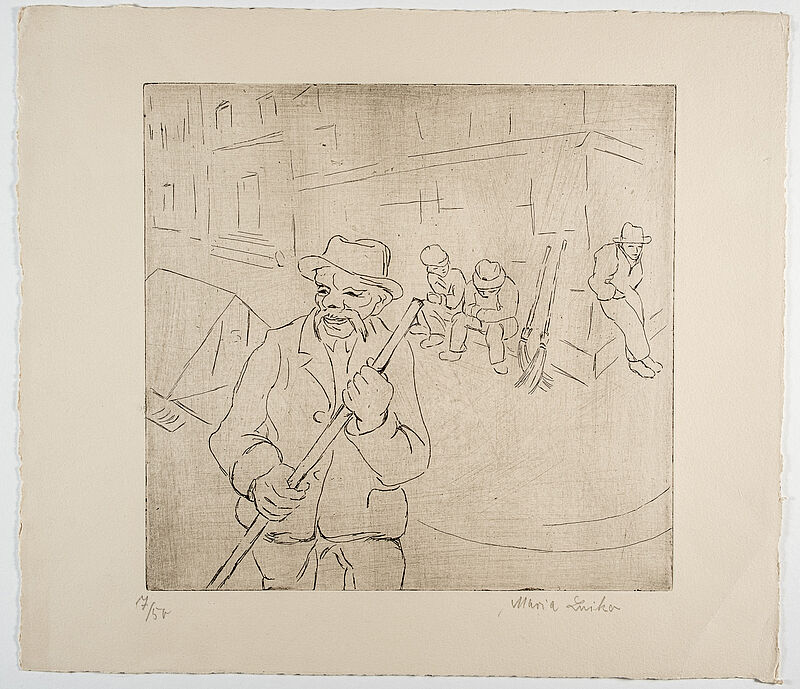
Maria Luiko, Street Sweeper (Straßenfeger I), ca. 1935. Etching on paper, 32 cm x 36,5 cm. Jewish Museum Munich (Jüdisches Museum München), Collection Maria Luiko
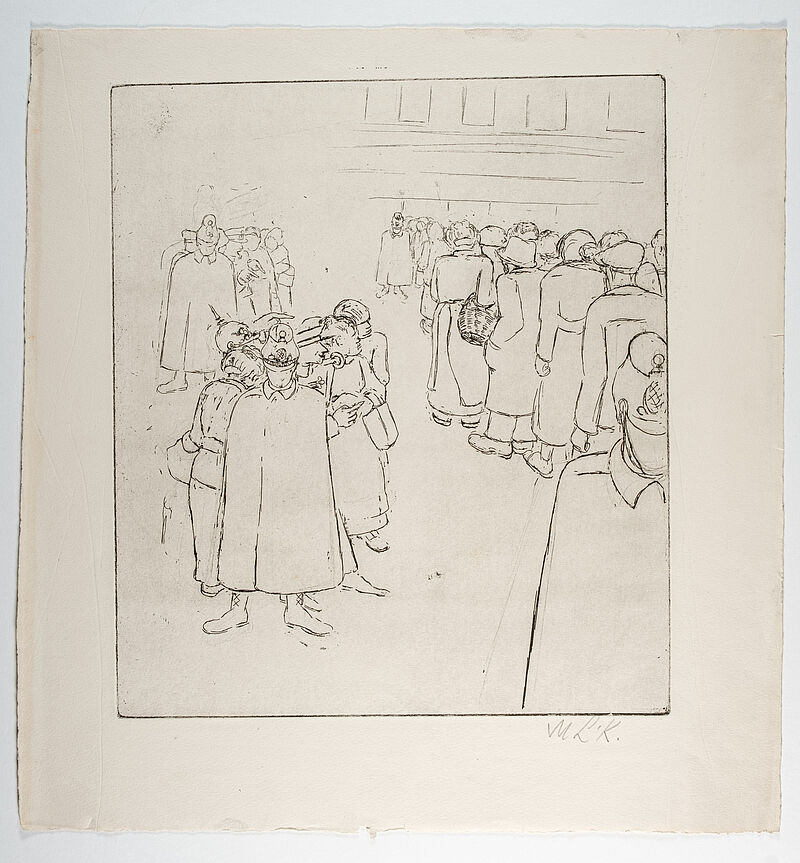
Maria Luiko, Line of People (Menschenschlange), ca. 1935. Etching on paper, 38 cm x 36 cm. Jewish Museum Munich (Jüdisches Museum München), Collection Maria Luiko
Her career was brutally cut short by the Nazi regime. As a Jew, Luiko was not able to join the Reich Chamber of Fine Arts (Reichskammer der bildenden Künste), a Nazi organization founded in 1933. Membership was decided on the basis of personal data as well as a professional or ideological assessment. Jews were not granted membership. Without membership, she could not obtain work materials, exhibit or sell her artwork. The Cultural Association of German Jews (Kulturbund Deutscher Juden) was founded to give Jews access to cultural life and to provide Jewish artists who had become unemployed with a livelihood.
Luiko made her studio available for exhibitions and theater rehearsals. In 1934, she participated in the “Graphic Exhibition of Bavarian Jewish Artists” in Munich, and in 1935/36 she designed the stage set for Semen Yushkevich’s play “Sonkin and the Main Hit”. In April 1936 she participated in the “Reich Exhibition of Jewish Artists” at the Berlin Jewish Museum.
She designed and created the puppets for the Munich Marionette Theater of Jewish Artists.
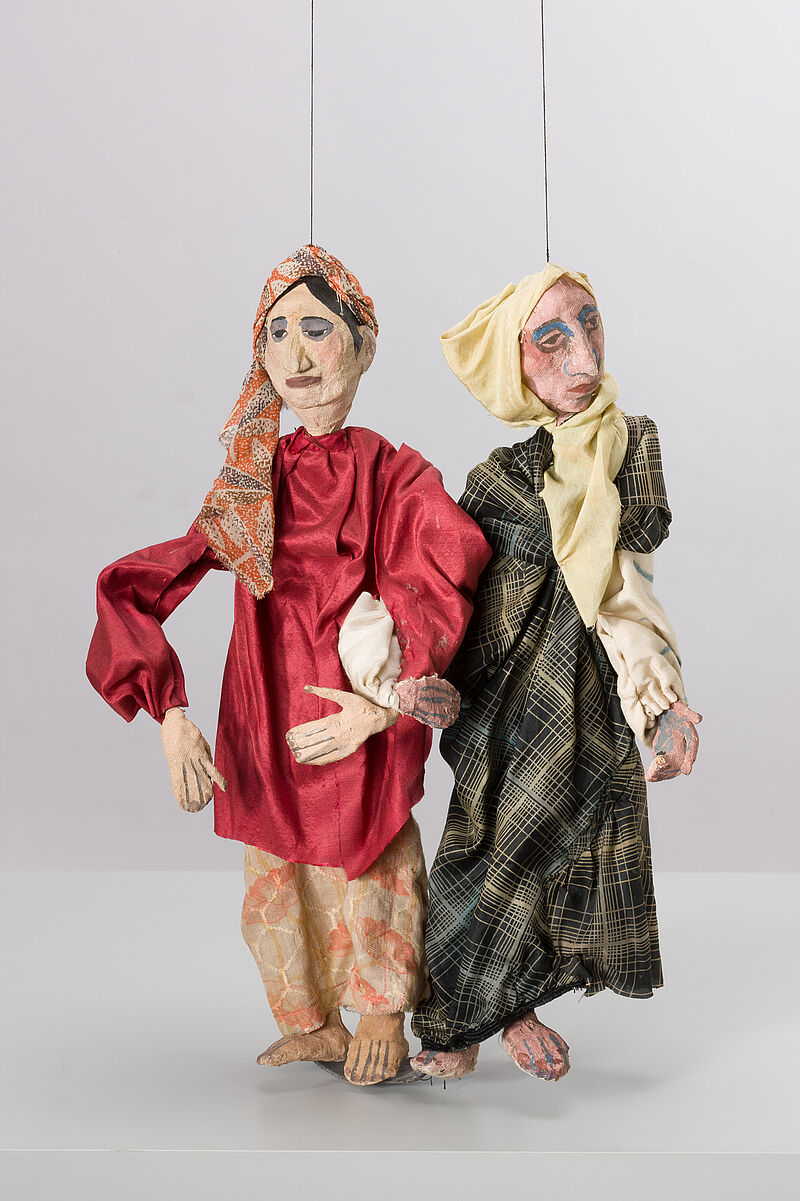
Maria Luiko, Munich Marionette Theater of Jewish Artists, Marionette “Israelite” (1/2) (Marionette “Israelitin” (1/2)), 1935. Papier-Mâché laminated, colored; Textile, wire, 42 cm. Münchner Stadtmuseum, Sammlung Puppentheater / Schaustellerei (Munich City Museum, Puppet Theatre / Fairground Attractions Collection)
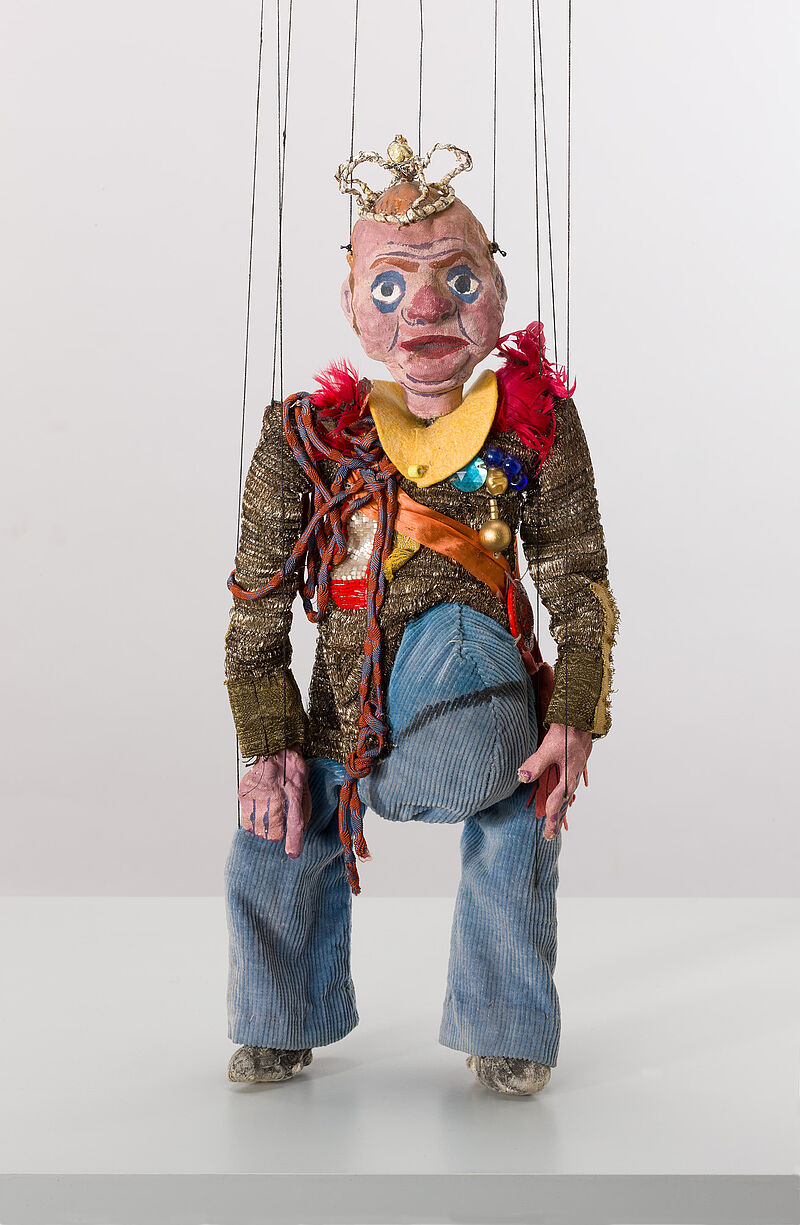
Maria Luiko, Munich Marionette Theater of Jewish Artists, Marionette “Cacatois XXII., Duke of Tulipatan” (Marionette “Cacatois XXII., Herzog von Tulipatan”), 1937. Wood, papier-mâché laminated, painted; Textile, wire, 46 cm. Münchner Stadtmuseum, Sammlung Puppentheater / Schaustellerei (Munich City Museum, Puppet Theatre / Fairground Attractions Collection)
On November 20, 1941, Luiko was deported “to the East” from Munich, together with her mother and sister, and 998 other Jewish people. The passenger train originally destined for Riga was diverted by the SS to Kovno (Kaunas). On November 25, 1941, all prisoners of Kaunas Fort IX were murdered.
Mascha Erbelding is the director of the of the Sammlung Puppentheater / Schaustellerei des Münchner Stadtmuseums (Puppet Theatre / Fairground Attractions Collection). She studied dramaturgy, comparative literature and history at the Bavarian Theatre Academy August Everding / Ludwig Maximilian University in Munich, at the FU Berlin and at the Université Rennes II. Her diploma thesis on „Mit dem Tod spielt man nicht. Funktion und Gestalt des Todes im Figurentheater des 20. Jahrhunderts“ (One Does Not Play with Death. Function and Form of Death in Twentieth-Century Century Puppet Theatre) was published in 2006. She is the artistic and organisational director of the Munich International Puppet Theatre Festival “Wunder.” and the „KUCKUCK“ festival for children 0-5. Since 2007 she has been a member of the editorial board of the puppet theatre magazine double. She contributed to the „Compendium of German artistic puppet theater 1900-1945“ (edited by Manfred Wegner in 2019).
Wolfram P. Kastner is an independent artist, researcher and and curator. He studied art, psychology, history and politics at the Munich university. He shows art in public spaces, which interferes and sometimes disturbs: art that makes visible what is otherwise invisible. His art usually causes reflection and discussion, contradiction, but also bans, death threats and court processes. In addition to interventions and actions in public on current and historical topics such as exclusion, violence and war, installations, objects and satirical, beautiful and sometimes angry pictures, drawings, objects, photos, etc. Exhibitions, installations and actions since 1980 between Berlin and Vienna, Budapest, Hamburg, Munich, Salzburg, Rotterdam. 2005 German Jewish History Award/Arthur Obermayer Foundation/Boston, 2005 “Nothing to see?”against the so-called “Judensau” sculptures at German churches, 2007 “Terrible Paths” project to commemorate the death march of Hungarian Jews in April 1945, 2008 “Unheard Music”, art project in memory of Jewish musicians and composers, 2011 Prize of the International Auschwitz Committee, 2022 Upright Walk Award, Humanist Union Germany
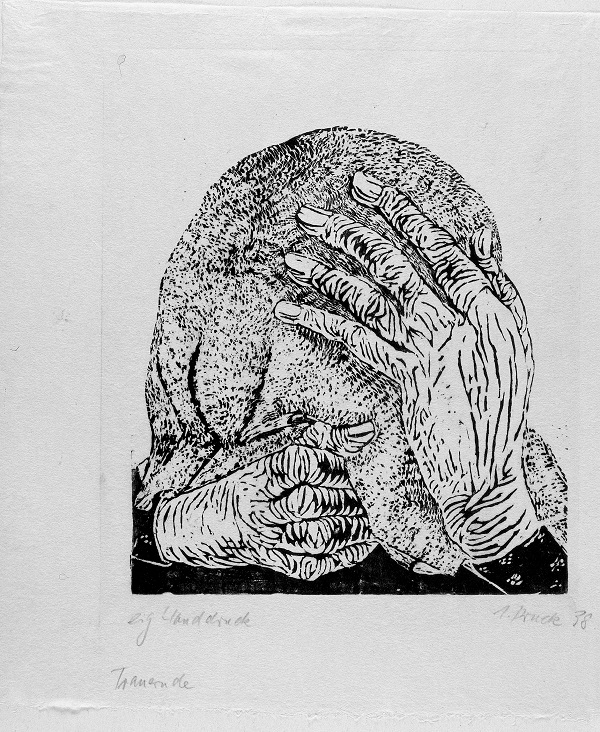
Maria Luiko, Woman Mourning (Trauernde Frau), 1938. Woodcut. Jewish Museum Munich (Jüdisches Museum München), Collection Maria Luiko
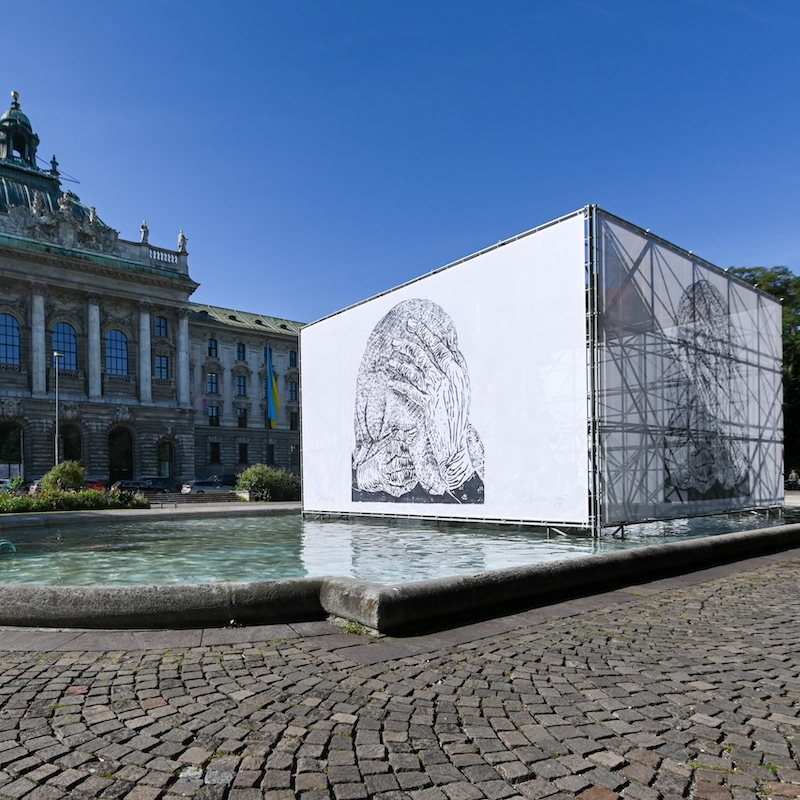
“Maria Luiko, Mourner, 1938”. Wrapping of the Neptune Fountain in the Old Botanical Garden Munich by Michaela Melián, 2022
Mascha Erbelding’s exhibition, “(Not) A Doll’s House. Traditional Roles and Brand-New Images” includes puppets by Maria Luiko. Ensconced in doll’s houses, fairground booths, collections of curiosities, wherever, puppets and dolls have always exerted a powerful and fascinating appeal. Not only are they a prime figurative representation of humans, but they also manage to embody our innermost wishes, fears, and desires. The exhibition is on view April 2, 2023 – January 7, 2024 at Münchner Stadtmuseum (Munich City Museum) (LINK).
The publication “Ehemals jüdischer Besitz” can be ordered in the museum’s online shop (LINK).
Organized by the Fritz Ascher Society for Persecuted, Ostracized and Banned Art in New York, in cooperation with the Cultural Department of the Jewish Community in Munich.
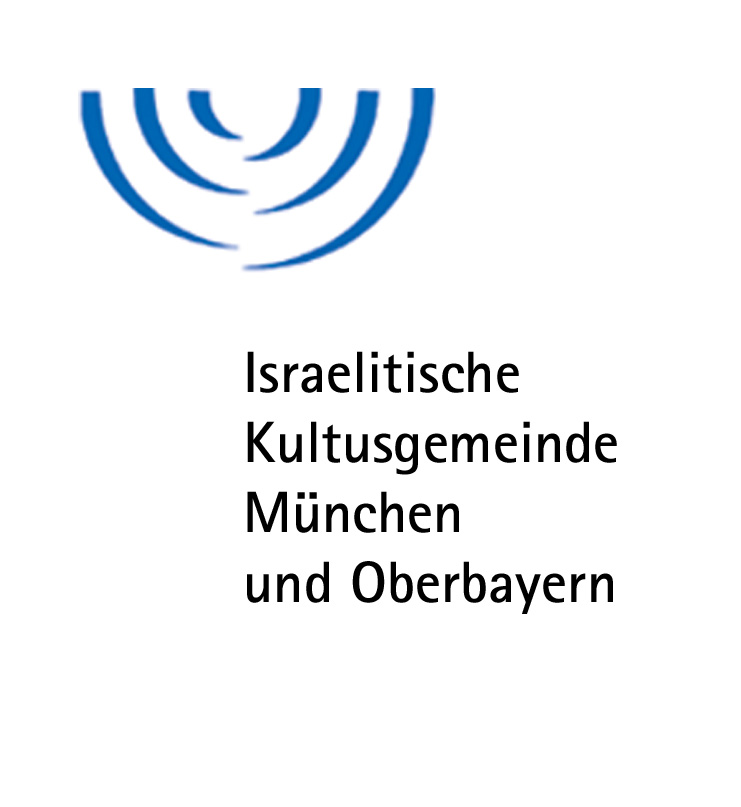
This event is part of our monthly series Flight or Fight. stories of artists under repression.
Future events and the recordings of past events can be found HERE.
The Fritz Ascher Society is a not-for-profit 501(c)3 organization. Your donation is fully tax deductible.
YOUR SUPPORT MAKES OUR WORK POSSIBLE. THANK YOU.


